Cuban president says no talks with US amid Trump’s escalating threats
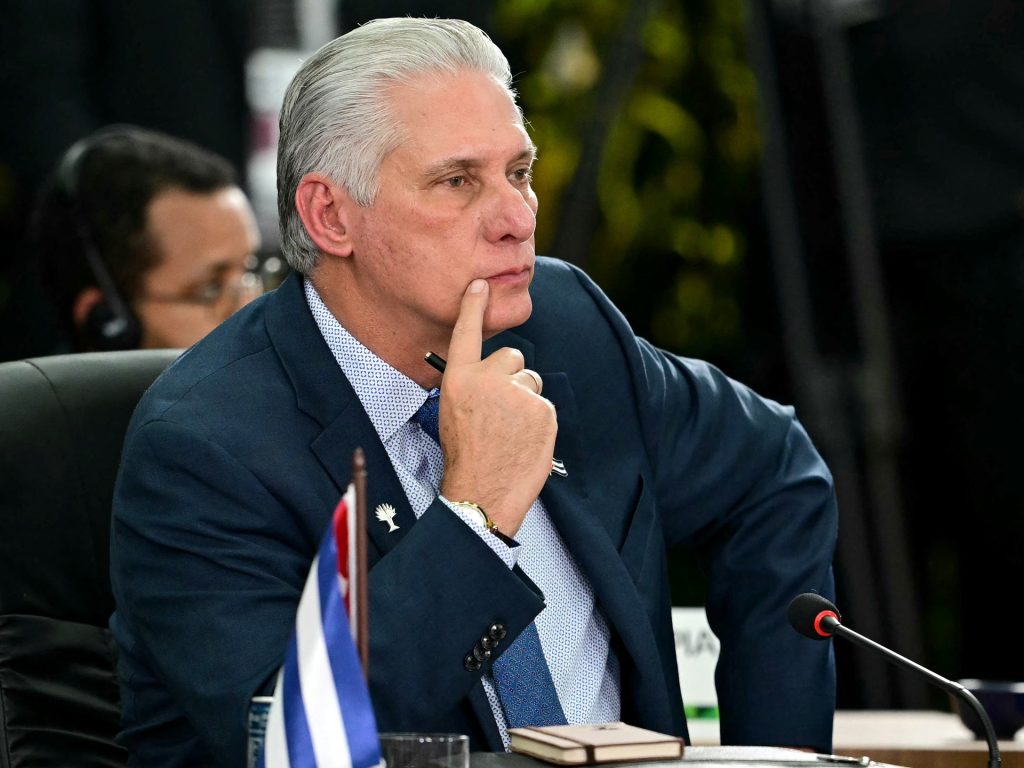
Diaz-Canel rejects Trump’s threats, emphasising Cuba’s independence and commitment to defending its sovereignty. By News Agencies Published On 12 Jan 202612 Jan 2026 Click here to share on social media share2 Share Cuban President Miguel Diaz-Canel has said that there are no current talks between Havana and the United States, as US President Donald Trump ratchets up threats against Cuba following his attack on Venezuela. Diaz-Canel stated in a social media post on Monday that routine coordination on immigration continues between Cuba and the US, but that no larger talks are currently taking place. Recommended Stories list of 3 itemsend of list “We have always been willing to maintain serious and responsible dialogue with the various US administrations, including the current one, on the basis of sovereign equality, mutual respect and the principles of international law,” Diaz-Canel said. He added that relations between the US and Cuba should be based on international law rather than “hostility, threats, and economic coercion”. Trump has said that the US could ramp up pressure on Cuba after the US abduction of Venezuela’s President Nicolas Maduro in a January 3 attack that killed at least 100 people, including 32 members of the Cuban security forces in the country for security cooperation. The US president stated on Sunday that Venezuelan oil supplies to Cuba would be cut off and that the government in Havana should “make a deal” with the US before it’s “too late”. Trump also told reporters that the US was “talking to Cuba” without offering further details. Diaz-Canel responded to Trump’s comments on Sunday by saying that Cuba was a “free, independent, and sovereign” country and would defend itself “to the last drop of blood”. Venezuelan oil was an important economic lifeline to Cuba, isolated and under heavy US sanctions, providing 35,000 barrels of oil per day before the US attack, according to estimates from Jorge Pinon of the Energy Institute at the University of Texas at Austin. Advertisement Pinon, who tracks the shipments, also estimates that Mexico supplies Cuba with approximately 5,500 barrels of oil per day, while Russia supplies 7,500. Mexican President Claudia Sheinbaum has previously said that the US attack on Venezuela has increased the relative importance of Mexican oil to Cuba, but that Mexico has not increased oil sales to Havana. Sheinbaum, who has responded to recent threats from Trump of possible military strikes against criminal groups on Mexican soil with a firm insistence on the country’s sovereignty, said that she spoke with Trump on Monday to discuss cooperation on issues such as commerce, security, and drug trafficking. “We had a very good conversation with US President Donald Trump,” Sheinbaum said in a social media post, adding that the talks included a discussion of security “with respect to our sovereignties”. “Collaboration and cooperation within a framework of mutual respect always yield results,” she said. Adblock test (Why?)
Trump says US military considering ‘very strong options’ for Iran
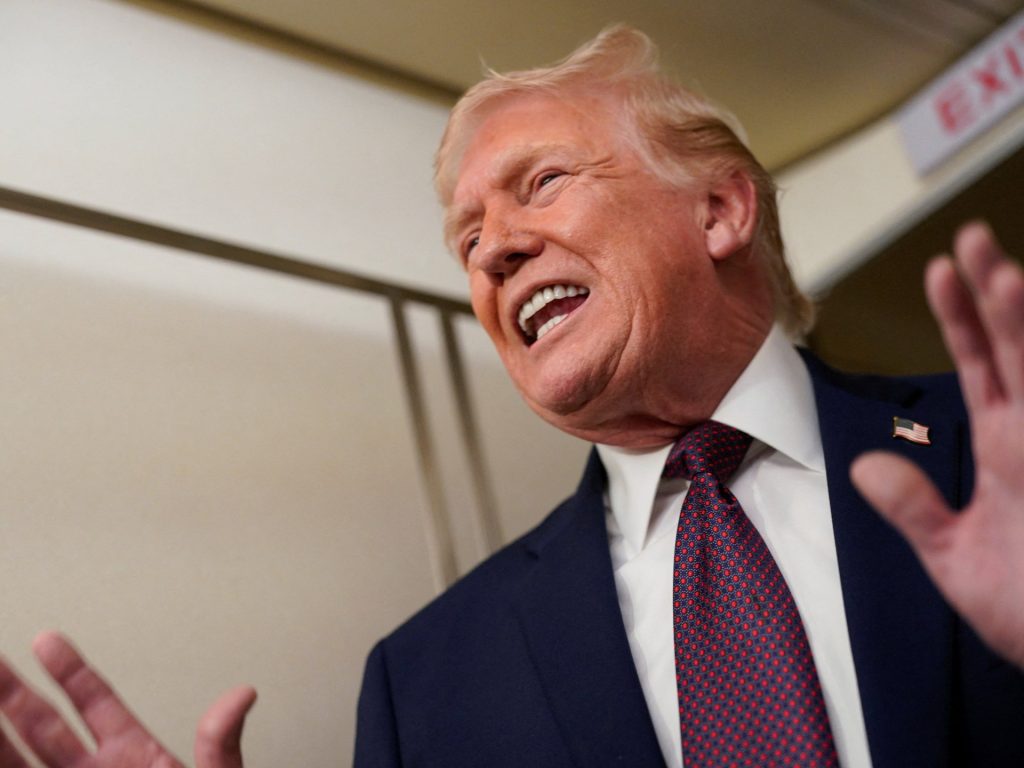
DEVELOPING STORYDEVELOPING STORY, US president says Washington is closely monitoring protests in Iran and considering possible military intervention. United States President Donald Trump has said that Washington is considering “strong options” in response to the protests in Iran, including possible military intervention. “We’re looking at it very seriously. The military is looking at it, and we’re looking at some very strong options. We’ll make a determination,” he told reporters on board Air Force One late on Sunday. He said Iran’s leadership had called, seeking “to negotiate” after his threats of military action, and that a “meeting is being set up”. But he added that “we may have to act before a meeting”. Trump’s latest threat came as Iranian leaders issued a stark warning against military intervention, with Parliament Speaker Mohammad Baqer Qalibaf saying “In the case of an attack on Iran, the occupied territories [Israel] as well as all US bases and ships will be our legitimate target”. The protests began on December 28, when merchants at Tehran’s Grand Bazaar closed their shops over the Iranian rial’s plummeting value. The demonstrations quickly spread nationwide, with grievances evolving from economic concerns over soaring living costs to broader opposition against Iran’s clerical establishment, who have governed the country since the Islamic Revolution in 1979. According to Iranian state media, at least 109 security personnel have been killed during the unrest, and authorities have not confirmed the number of demonstrators who have lost their lives. But opposition activists based outside the country say the death toll is higher and includes hundreds of protesters. Advertisement A nationwide internet blackout has also persisted for more than 72 hours, according to monitoring groups. The unrest in Iran is unfolding as Trump pursues an assertive foreign policy, having abducted Venezuelan President Nicolas Maduro, and discussing acquiring Greenland by purchase or force. Trump was scheduled to meet with senior advisers on Tuesday to discuss options for Iran, a US official told the Reuters news agency. The Wall Street Journal reported that options included military strikes, using secret cyberweapons, widening sanctions and providing online help to antigovernment sources. Trump said on Sunday that he plans to speak with billionaire Elon Musk about restoring internet in Iran. “He’s very good at that kind of thing, he’s got a very good company,” Trump told reporters in response to a question about whether he would engage with Musk’s SpaceX company, which offers a satellite internet service called Starlink that has been used in Iran. The US leader also spoke on his plans for Greenland and Venezuela. On Greenland, he called for the Danish Arctic territory to “make a deal”, and said “we are talking about acquiring it, not making a short term deal”. On Venezuela, Trump confirmed he would be meeting with Venezuelan opposition leader, Maria Corina Machado on Tuesday or Wednesday. Adblock test (Why?)
Russia-Ukraine war: List of key events, day 1,418
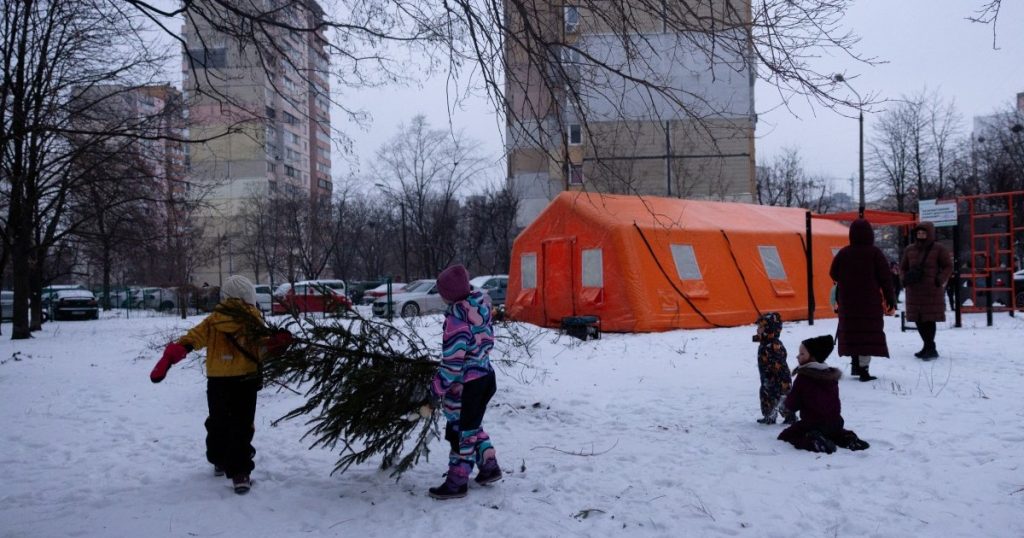
These are the key developments from day 1,418 of Russia’s war on Ukraine. By News Agencies Published On 12 Jan 202612 Jan 2026 Click here to share on social media share2 Share Here is where things stand on Monday, January 12: Fighting Russia launched an air attack on Kyiv overnight on Monday, sparking a fire in one of the city’s districts, according to the Ukrainian military. Ukrainian air defence units were trying to repel the attack, said Tymur Tkachenko, the head of Kyiv’s military administration. More than 1,000 apartment buildings in the Ukrainian capital, Kyiv, are still without heating three days after a devastating Russian attack, according to Ukrainian authorities. Ukrainian Prime Minister Yulia Svyrydenko said in a statement on Telegram that not a single day passed this week without Russian attacks on energy facilities and critical infrastructure, which have totalled at least 44. A Ukrainian drone attack on the Russian city of Voronezh killed a woman and wounded three other people on Sunday, the region’s governor, Alexander Gusev, said. The governor said that more than 10 apartment buildings, about 10 private houses, a secondary school and several administrative buildings were also damaged in the attack on Voronezh. Ukraine’s military said it had made “direct hits” on three drilling platforms in the Caspian Sea belonging to Russia’s Lukoil oil firm. The military said it hit the V Filanovsky, Yuri Korchagin and Valery Grayfer platforms. Russia’s Ministry of Defence claimed control of the village of Bilohirya in Ukraine’s southeastern Zaporizhia region, according to the TASS state news agency. The Ukrainian Ministry of Defence’s main intelligence directorate said that Russia deployed the new jet-powered “Geran-5” strike drone against Ukraine this month, for the first time. The Geran is a Russian variant of the Iranian-designed Shahed. The drone can carry a 90kg (200-pound) warhead and has a range of nearly 1,000km (620 miles). Military aid Advertisement The United Kingdom announced that it will develop a new deep-strike ballistic missile for Ukraine to support the country’s war efforts against invading Russian forces. Under the project, named Nightfall, the UK seeks to develop missiles that could carry a 200kg (440 lbs) warhead over a range of more than 500km (310 miles). Sweden said it will spend 15 billion Swedish crowns ($1.6bn) on air defence, aimed at primarily protecting civilians and civilian infrastructure, as the country continues to ramp up its forces in response to the Russian invasion of Ukraine. The European Union’s defence commissioner, Andrius Kubilus, said the bloc should consider setting up a combined military force that could eventually replace US troops in Europe. Kubilus, a former Lithuanian prime minister, said such a force, numbering up to 100,000, would be a possible option to better protect Europe. Politics and diplomacy The head of the European Commission, Ursula von der Leyen, said it was now up to Russia to show it is interested in peace, after Kyiv and its allies agreed to implement a 20-point peace plan and security guarantees, which would take effect following a ceasefire. Von der Leyen said that, under the plan, Ukraine would rely first on its own armed forces, which she said were well-trained and battle-experienced. It would be the task of the Europeans to make sure the Ukrainian army is also well equipped, she said. Von der Leyen added that the second line of defence would be the so-called Coalition of the Willing – 35 states, including most EU countries as well as Canada, the UK, Australia, New Zealand and Turkiye. Adblock test (Why?)
Timothée Chalamet, Paul Thomas Anderson take honours at Gloden Globes
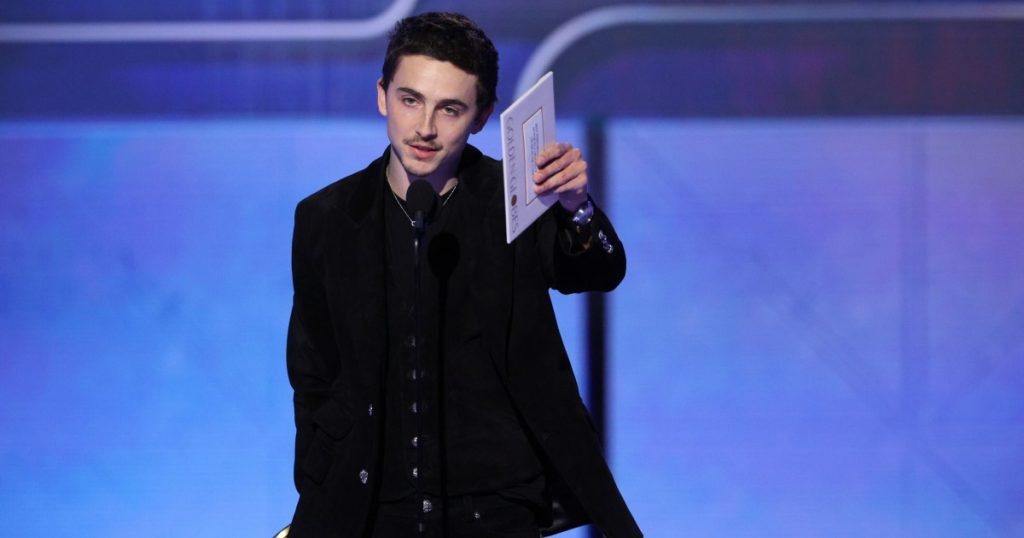
DEVELOPING STORYDEVELOPING STORY, Chalamet picks up best actor award for his role in sport comedy-drama Marty Supreme. Published On 12 Jan 202612 Jan 2026 Click here to share on social media share2 Share Hollywood actor Timothée Chalamet has nabbed his first Golden Globe at the 83rd edition of the annual awards ceremony. Chalamet, 30, picked up the award for best actor in a musical or comedy on Sunday in recognition of his role in the sport comedy-drama Marty Supreme. “My dad instilled in me a spirit of gratitude growing up: Always be grateful for what you have,” Chalamet said in his acceptance speech at The Beverly Hilton hotel in Beverly Hills, California. “It’s allowed me to leave this ceremony in the past empty-handed, my head held high, grateful just to be here. I’d be lying if I didn’t say those moments didn’t make this moment that much sweeter.” More to follow… Adblock test (Why?)
Hunger strike for 70 days: How the body breaks down without food
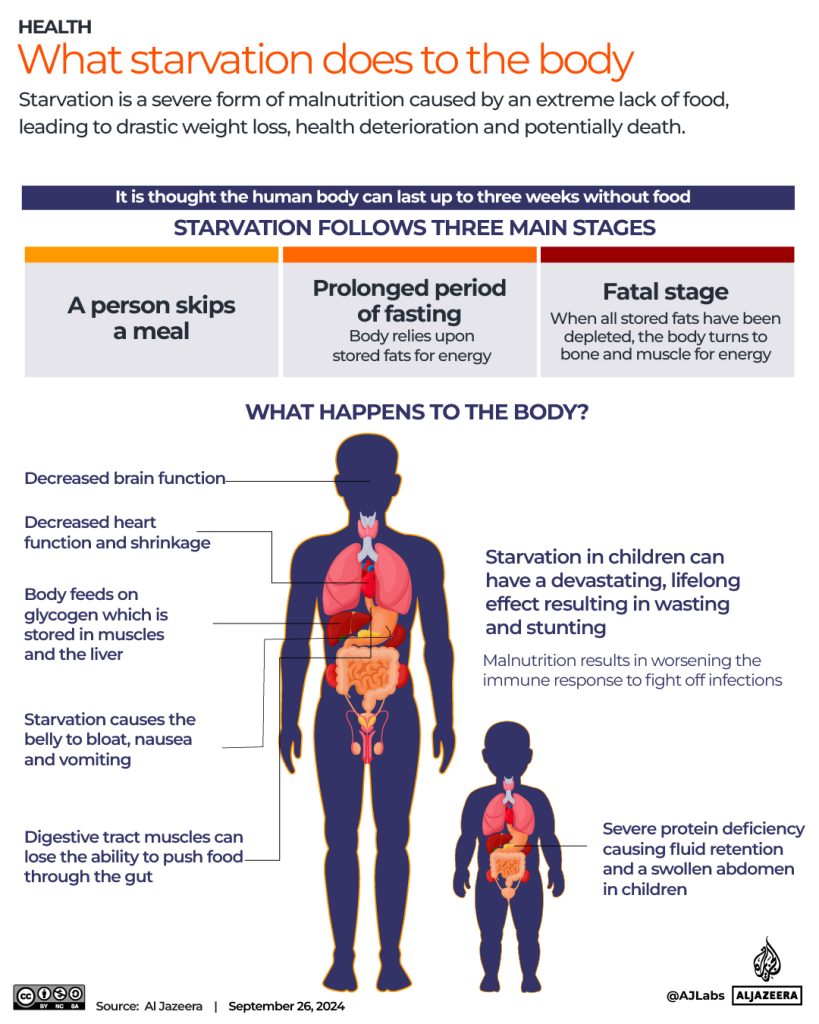
Medical estimates put survival without food at 45 to 61 days. Three Palestine Action activists in the UK are now pushing beyond that boundary. Three British activists from the proscribed Palestine Action group are on hunger strike seeking bail and a fair trial, with friends and relatives warning they are close to death but determined to continue until their demands are met. Heba Muraisi and Kamran Ahmed have refused food for 70 and 63 days respectively as part of a rolling hunger strike that began in November. A third prisoner, Lewie Chiaramello, is also refusing food on alternating days due to type 1 diabetes. Five of the eight people who took part in the protest have ended their hunger strikes due to health concerns. They are held in different jails over their alleged involvement in break-ins at the United Kingdom subsidiary of Israeli defence firm Elbit Systems in Bristol, where equipment was damaged, and at a Royal Air Force base in Oxfordshire, where two military aircraft were sprayed with red paint. They deny all charges. The group is demanding: Bail and the right to a fair trial, and the reversal of the UK government’s July designation of Palestine Action as a “terrorist organisation”, placing it alongside ISIL (ISIS) and al-Qaeda. Closure in the UK of all Elbit sites, which are facilities operated by Israel’s largest defence company, manufacturing military technology used by the Israeli armed forces and other governments. An end to what they describe as censorship inside prison, including the withholding of mail, phone calls and books. All eight will have spent more than a year in custody without trials, exceeding the UK’s usual six-month pre-trial detention limit. Advertisement What does prolonged hunger do to the body? In the early stages of starvation, after several days without food, the body begins breaking down muscle to produce energy. As the fast continues, metabolism slows down. The body loses its ability to regulate temperature, kidney function deteriorates, and the immune system weakens, reducing the body’s ability to heal from injury. Once the body’s reserves are depleted, it can no longer prioritise nutrients for vital organs. The heart and lungs become less efficient, muscles shrink and profound weakness sets in. Eventually, as protein stores are depleted, and the body begins to break down its own tissues. At this stage, death may be imminent. Scientific research on prolonged starvation is limited due to ethical reasons; however, estimates suggest that a healthy, well-nourished adult could survive without food for between 45 and 61 days, which means the three activists have now reached, or exceeded, that threshold, placing them in extreme, life-threatening danger. International concern Hunger strikes have long been used as an extreme, non-violent form of protest, relying on moral pressure to compel those in power to act. Historical records trace the practice to ancient India and Ireland, where people would fast at the doorstep of someone who had wronged them as a form of public shaming. In modern times, hunger strikes remain powerful political statements, often drawing international attention to cases of imprisonment, injustice or repression, even at the cost of the striker’s life. Hundreds of Palestinian prisoners incarcerated without any charges by Israel have resorted to hunger strikes to bring attention to their cases. United Nations experts said hunger strikes are “often a measure of last resort by people who believe their rights to protest and effective remedy have been exhausted”. They added that the state’s duty of care towards hunger strikers is heightened, not diminished, and that authorities must ensure timely access to emergency and hospital care, refrain from pressure or retaliation, and respect medical ethics. Kerry Moscogiuri, director of campaigns and communications at Amnesty International UK, called the situation alarming. She said it was “shocking that these activists have been forced to resort to such desperate measures to bring attention to their plight”, adding that the crisis reflects a “gross misuse of counterterrorism powers”. Adblock test (Why?)
Germany’s double standard on peaceful protests
[unable to retrieve full-text content] Germany’s double standard on peaceful protests
LIVE: Barcelona vs Real Madrid: El Clasico Supercopa final 2026

blinking-dotLive MatchLive Match, Follow our live build-up with team news coverage before our live text commentary stream of Spain’s Super Cup final. Published On 11 Jan 202611 Jan 2026 Click here to share on social media share2 Share Adblock test (Why?)
US launches ‘large-scale’ attacks against ISIL in Syria after deadly ambush

US military says the strikes are in response to an ISIL ambush that killed three American personnel in Palmyra last month. Published On 10 Jan 202610 Jan 2026 Click here to share on social media share2 Share The United States has carried out a new round of “large-scale” attacks against the ISIL or ISIS group in Syria following an ambush that killed two US soldiers and a civilian interpreter in the city of Palmyra last month. The US Central Command (CENTCOM) said in a statement on Saturday that the attacks occurred at about 17:30 GMT and hit “multiple ISIS targets across Syria”. Recommended Stories list of 4 itemsend of list “Our message remains strong: if you harm our warfighters, we will find you and kill you anywhere in the world, no matter how hard you try to evade justice,” CENTCOM said. The statement did not say whether anyone was killed in the strikes. Grainy aerial video accompanying the statement, posted on X, showed several separate explosions, apparently in rural areas. CENTCOM said the attacks were carried out alongside partner forces, without specifying which forces had taken part. The US is calling the response to the Palmyra attacks Operation Hawkeye Strike. The ambush on December 13 involved a lone gunman, who Syria’s Ministry of Interior said was a member of the security forces and had been set to be fired for his hardline views. The US military launched the operation on December 19, with a large-scale strike that it said hit 70 targets across central Syria that had ISIL infrastructure and weapons. On December 30, it said its forces had killed or captured about 25 ISIL fighters following the launch of the operation. The Kurdish-led Syrian Democratic Forces has for years been the US’s main partner in the fight against ISIL in Syria, but since the ouster of former Syrian President Bashar al-Assad in December 2024, Washington has increasingly been coordinating with the central government in Damascus. Advertisement Syria joined the global coalition against ISIL after reaching an agreement late last year, when Syrian President Ahmed al-Sharaa visited the White House. Syrian officials said last month that leading ISIL figure Taha al-Zoubi had been arrested in the Damascus countryside. US President Donald Trump has long been sceptical of Washington’s presence in Syria, ordering the withdrawal of troops during his first term, but ultimately leaving US forces in the country. About 1,000 US troops remain in Syria. The US military has said it would further reduce the number of US personnel in Syria and eventually reduce its bases in the country to one. Adblock test (Why?)
Russia-Ukraine war: List of key events, day 1,417
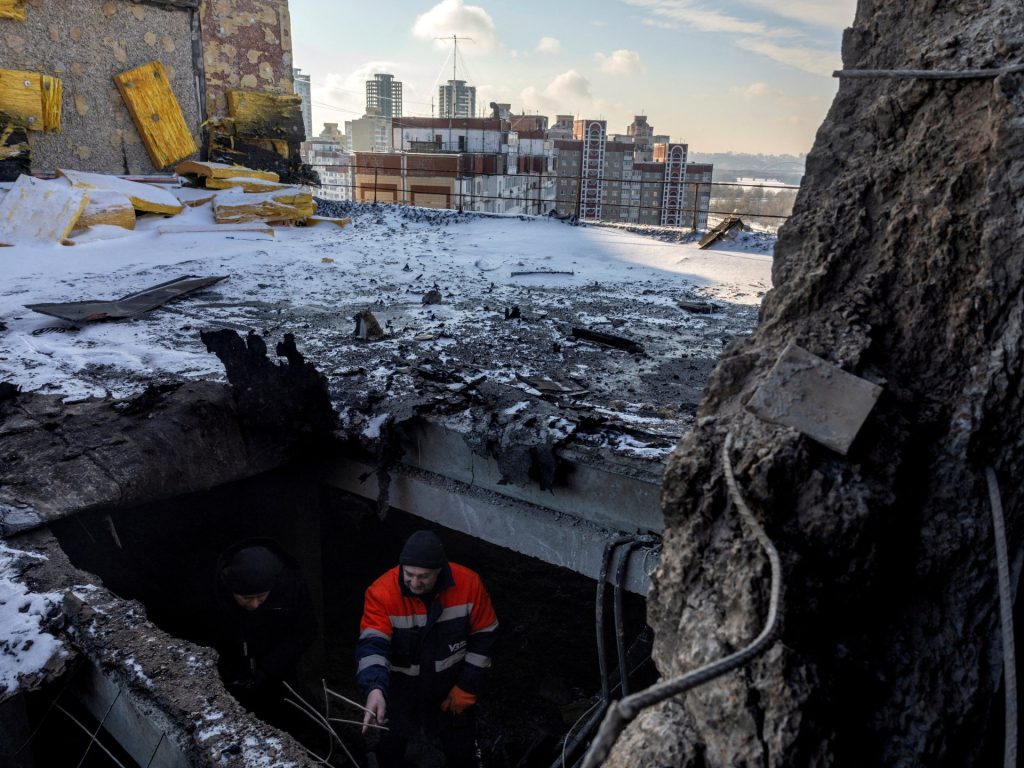
These are the key developments from day 1,417 of Russia’s war on Ukraine. By News Agencies Published On 11 Jan 202611 Jan 2026 Click here to share on social media share2 Share Here is where things stand on Sunday, January 11: Fighting: Russian forces launched artillery and drone attacks on Ukraine’s Dnipropetrovsk region on Saturday, killing a 68-year-old man, wounding three others and causing fires to break out in residential buildings, according to Ukraine’s emergency service. Russian shelling also killed another person in the Kramatorsk district of Ukraine’s Donetsk region, the service said. Three other Ukrainians were killed, and nine more were wounded, in Russian attacks on the areas of Yarova, Kostyanynivka and Sloviansk in Donetsk, according to Governor Vadym Filashkin. Ukraine’s General Staff reported 139 combat clashes on Saturday and said that Russia launched 33 air strikes, deployed more than 4,430 drones and carried out 2,830 attacks on Ukrainian troops and settlements. Russian forces advanced near the villages of Markove and Kleban-Byk in Ukraine’s Donetsk region, according to the Ukrainian battlefield monitoring site DeepState, but no other major changes were reported. In the Ukrainian capital, Kyiv, engineers are working “around the clock” to restore electricity to residents after thousands of apartments lost power during Russia’s Thursday attacks, said Tymur Tkachenko, the head of the city’s military administration. Heat supplies have been returned to roughly half the homes that lost power, Kyiv Mayor Vitali Klitschko added. Russia’s TASS news agency reported that two people were wounded in a Ukrainian drone attack on the southwestern Russian city of Voronezh. The governor of Russia’s Belgorod region, which borders Ukraine, said on Saturday that 600,000 people in the area were without electricity, heating and water after a Ukrainian missile strike. Ukrainian forces also carried out a drone strike on Russia’s Volgograd region, sparking a fire at an oil depot in the Oktyabrsky district, regional authorities said. The Ukrainian military said on Saturday it had struck the Zhutovskaya oil depot in Volgograd overnight. Russian air defence systems, meanwhile, intercepted and destroyed 33 Ukrainian drones over Russian regions, the agency reported. Advertisement Politics and diplomacy The United Nations Security Council will host an emergency meeting on January 12 to “address Russia’s flagrant breaches of the UN Charter”, after Russia fired an Oreshnik hypersonic missile near the Polish border, Ukrainian Minister of Foreign Affairs Andrii Sybiha wrote on X. The foreign minister also spoke out about the antigovernment protests rocking Iran, saying that “Iran’s support for Russia’s war of aggression against Ukraine and its oppression of its own citizens are part of the same policy of violence and disrespect for human dignity”. The deputy chairman of Russia’s Security Council, Dmitry Medvedev, insisted that Russia will not accept European or NATO troops in Ukraine and that “European dimwits want a war in Europe after all”. “Well, come on then. This is what you’ll get”, the deputy chairman added, accompanied by a video of the Oreshnik strike. The Institute for the Study of War wrote in its latest report that Russia’s Oreshnik strike was likely “aimed to scare Western countries from providing military support to Ukraine, particularly from deploying forces to Ukraine as part of a peace agreement”. Ukraine’s lead negotiator, Rustem Umerov, “once again reached out to our American partners”, Ukrainian President Volodymyr Zelenskyy wrote on Telegram. “We continue communication with the American side practically every day,” he said. South Africa kicked off a week of naval drills, also attended by Russia, Iran and China. Captain Nndwakhulu Thomas Thamaha, South Africa’s joint task force commander, told the opening ceremony that the drills are “a demonstration of our collective resolve to work together”. Sanctions Zelenskyy pledged on X that “we will continue strengthening the sanctions toolkit” and that “all lines of pressure on Russia and individuals associated with it must be maintained”. In reference to recent news that US President Donald Trump has greenlit a bill to sanction countries that buy Russian oil, Zelenskyy said: “What is important is that the US Congress is back in motion on tougher sanctions against Russia – targeting Russian oil. This can truly work.” Energy Russian presidential envoy Kirill Dmitriev said Russian oil products have “significantly increased” after Bloomberg reported that Russian refined fuel flows hit a four-month high in December, driven by stronger diesel shipments from ports in the Baltic Sea. Dmitriev added on X that “fake warmonger narratives are bad for decision-making”. Separately, Bloomberg also reported that Russia’s crude oil production dropped to its lowest level in a year and a half in December, hitting 9.32 million barrels per day. Advertisement Adblock test (Why?)
Last Kurdish-led SDF fighters leave Syria’s Aleppo after days of clashes
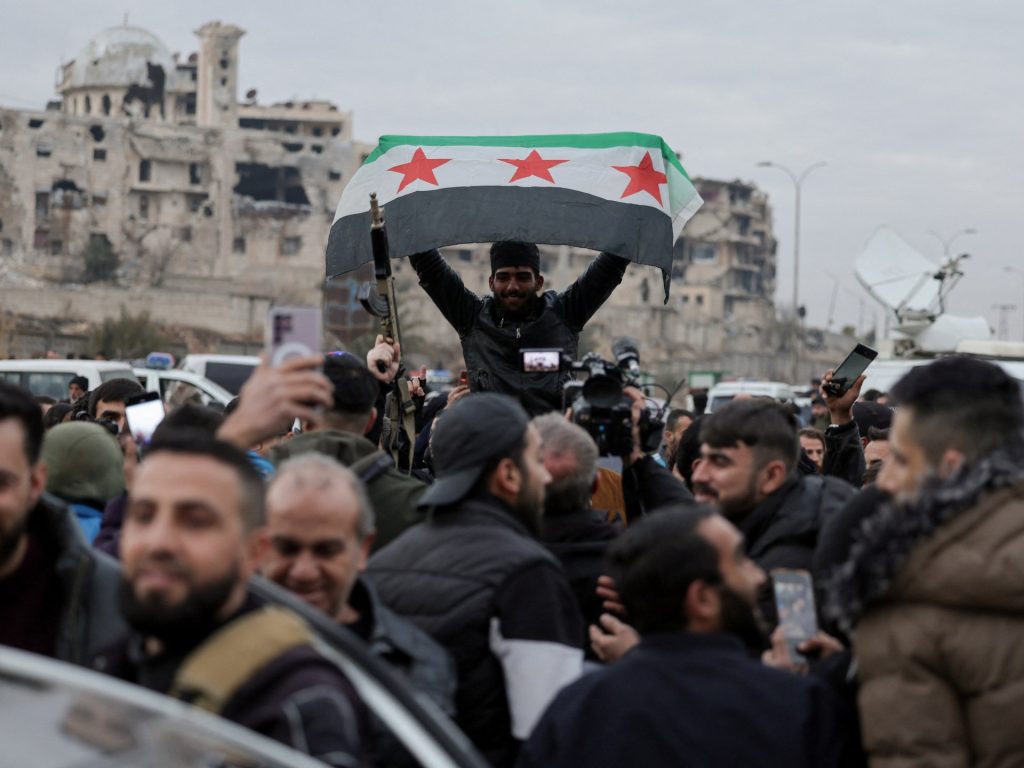
Aleppo governor says last SDF fighters have left the city after the Syrian army took control of the Sheikh Maqsoud neighbourhood. The last fighters from the Kurdish-led Syrian Democratic Forces (SDF) have left the city of Aleppo, according to officials, following a ceasefire deal that allowed evacuations after days of deadly clashes in Syria’s second-largest city. Aleppo Governor Azzam al-Gharib told Al Jazeera early on Sunday that Aleppo has become “empty of SDF fighters” after government forces coordinated their withdrawal on buses out of the city overnight. Recommended Stories list of 4 itemsend of list SDF commander Mazloum Abdi (also known as Mazloum Kobani) said the group had reached an understanding through international mediation on a ceasefire and the safe evacuation of civilians and fighters. “We have reached an understanding that leads to a ceasefire and securing the evacuation of the dead, the wounded, the stranded civilians and the fighters from the Ashrafieh and Sheikh Maqsoud neighbourhoods to northern and eastern Syria,” he said in a post on X. “We call on the mediators to adhere to their promises to stop the violations and work towards a safe return for the displaced to their homes,” he added. The development came after the Syrian army took over the Kurdish-majority neighbourhood of Sheikh Maqsoud following days of clashes that broke out when talks to integrate the SDF into the national army collapsed. At least 30 people were killed in the clashes, while more than 150,000 were displaced. Al Jazeera’s Ayman Oghanna, reporting from Damascus, said calm has returned to Aleppo, and that the United States was instrumental in brokering the agreement between the SDF and the government. Advertisement “The US is in a unique position, because it enjoys good relations with the SDF and the government,” Oghanna said, noting that Washington has been working with the Kurdish-led force against ISIL (ISIS) for more than a decade. With the fall of former President Bashar al-Assad’s government in late 2024, the US has also built close ties with the rebel commander who became Syria’s interim leader, Ahmed al-Sharaa. The Syrian president met US President Donald Trump at the White House last year and has formally joined the US-led coalition against ISIL. The fighting in Aleppo began on Tuesday in the predominantly Kurdish neighbourhoods of Sheikh Maqsoud, Ashrafieh and Bani Zaid, amid tensions over a failure to implement a March 2025 agreement to reintegrate the Kurdish forces into state institutions. The deadline for the deal passed at the end of last year, and the SDF refused to leave areas that have been under its control since the early days of the Syrian war, which erupted in 2011. Al Jazeera’s Oghanna said that though the fighting in Aleppo has ended, “the fault line, the backdrop for this fighting, remains”. “There are many difficult issues in Syria, but the greatest threat to national stability and unity remains this question of whether the SDF join Damascus and be under Damascus’s control,” he said. The SDF has a large amount of fighters, estimated at between 50,000 to 90,000. They are mainly in the northeast of the country and control almost a quarter of Syria’s territory. Oghanna said the fighting in Aleppo makes the SDF integration “look far less likely”. “There are also other sticking points, which might make the SDF refuse to put down their weapons,” he said. “The SDF don’t want to cede control of the country’s northeast, and they want to maintain a certain amount of autonomy in order to have the governance in northeastern Syria.” Adblock test (Why?)

